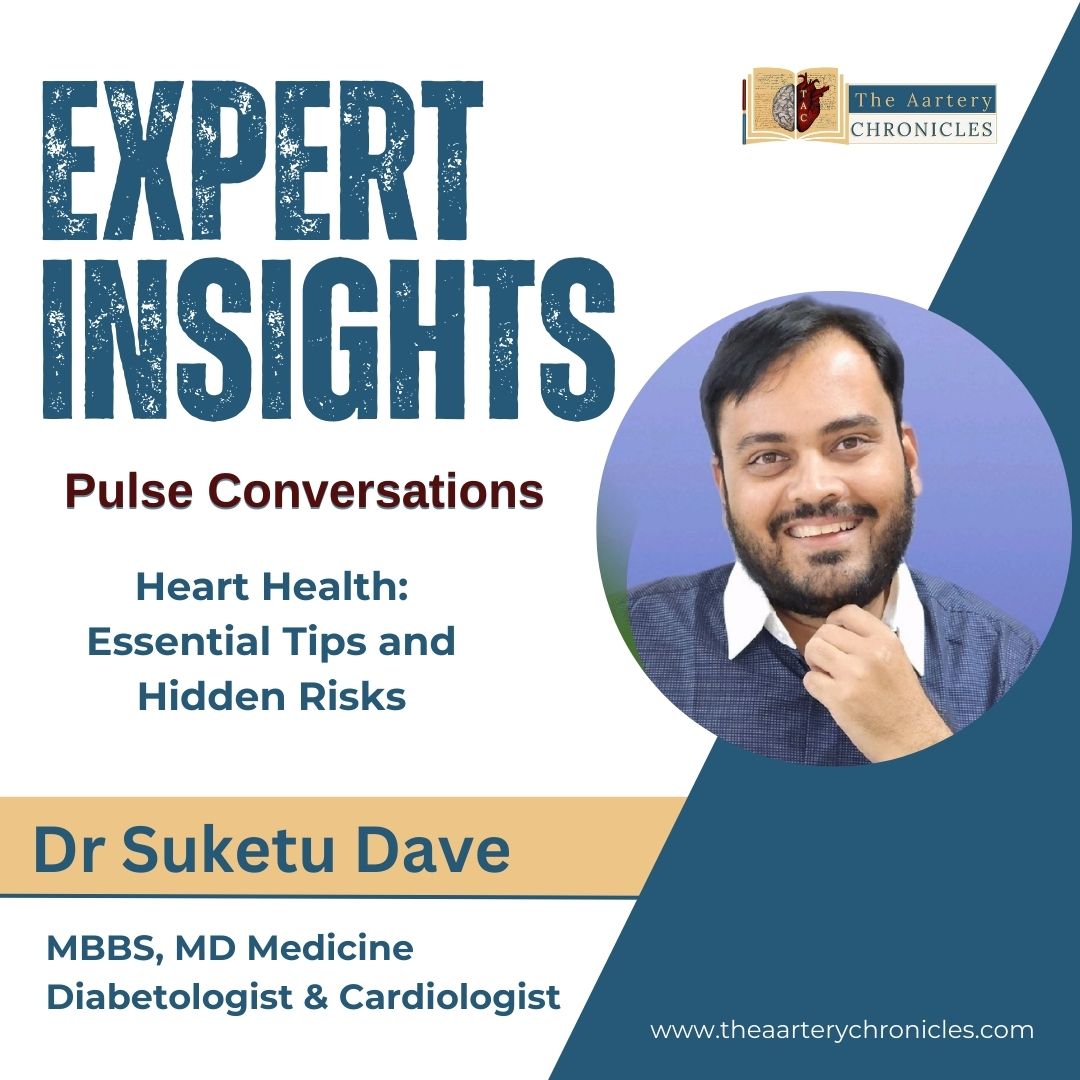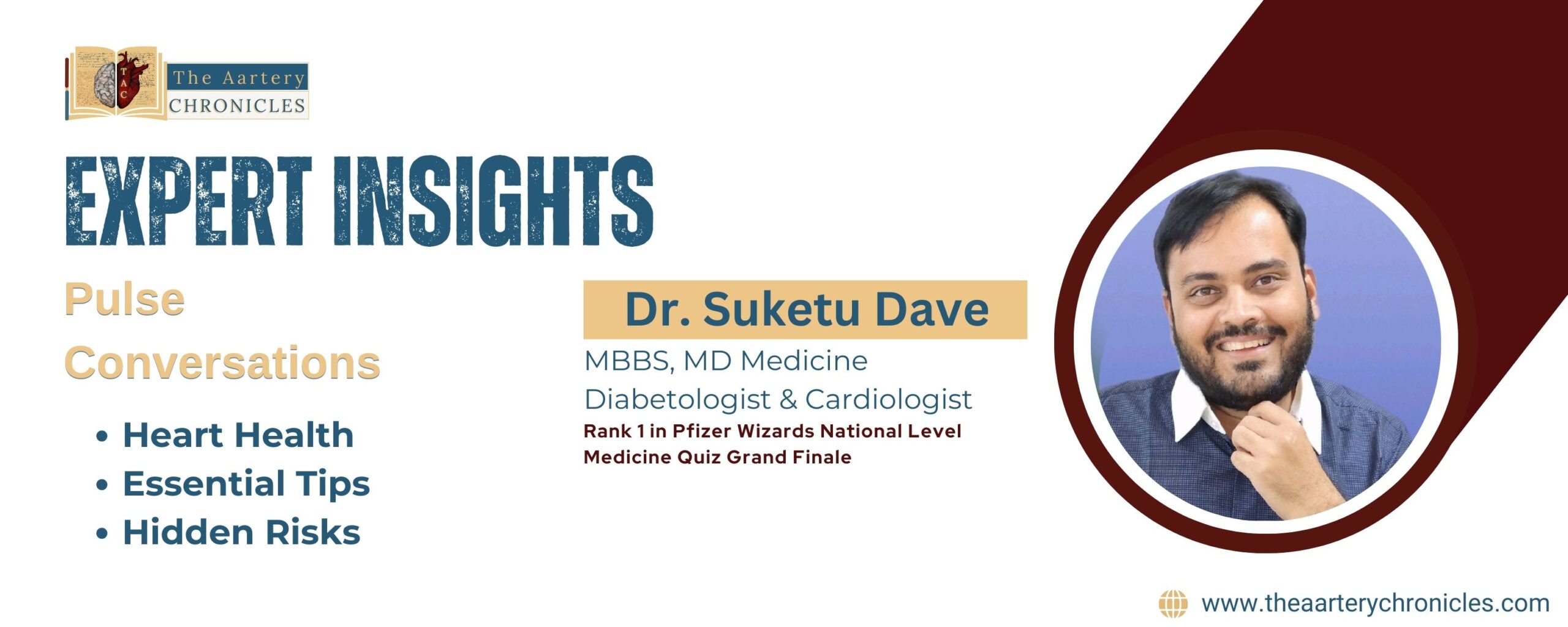

Heart Health: Essential Tips and Hidden Risks by expert Dr Suketu Dave that You Need to Know!
Heart attacks are becoming alarmingly common among individuals aged 20-30. Not long ago, heart attacks were predominantly associated with older adults, and cases in those under 40 were rare. Today, 1 in 5 heart attack patients are under the age of 40.
Even more concerning is the increasing frequency of heart attacks in people in their 20s and early 30s. Between 2000 and 2016, the incidence of heart attacks in this age group rose by 2% annually.
Additionally, sudden cardiac arrest, a condition often linked to heart attacks, accounts for over 50% of cardiovascular-related deaths worldwide, with younger adults increasingly affected in recent years. According to the American Heart Association, survival rates for out-of-hospital cardiac arrests remain below 12%, highlighting the critical need for awareness and prevention.
In light of these events, The Aartery Chronicles (TAC) connected with Dr. Suketu Dave, a renowned cardiology expert, to discuss essential heart health tips and uncover hidden risks. In a Pulse conversation hosted by Priya Bairagi from TAC, Dr. Dave shared valuable insights on maintaining heart health for a happier, longer life.
Dr. Dave completed his MBBS from Government Medical College Surat and MD Medicine from Baroda Medical College Gujarat. He has been working as a consultant physician, Diabetologist and intensivist at Kamubala polyclinic vadodara Gujarat. He is on the verge of completing his DM in Interventional Cardiology from the highly prestigious U. N. Mehta Institute of Cardiology and Research Centre, Ahmedabad, having secured an impressive All India Rank 5 in the DM Cardiology Entrance Examination.
Priya: How can a person suffer from a heart attack despite having a healthy lifestyle, such as playing sports and avoiding smoking and alcohol? What factors actually influence heart health and the risk of heart attacks?
Dr Suketu Dave: Myocardial infarction, or heart attack, is a multifactorial condition.
- The first factor is age; as we get older, our arteries naturally become stiffer, and the risk of atherosclerosis increases.
- Second is diet; consuming junk food or foods high in oils contributes to heart disease.
- Third, habits like smoking or other addictions play a significant role.
- Fourth, genetic and family factors are also crucial, as some people may have a tendency toward thicker blood or higher levels of stress.
It’s not uncommon to hear about someone, even doctors or other seemingly happy individuals, who suddenly passed away from a heart attack. Often, the reality is that despite outward appearances, they may not be truly content or stress-free. There’s a well-known story of a man who visited a psychologist because he was struggling with depression and wasn’t finding joy in life. After hearing his history, the psychologist recommended a book titled “How to Live a Happy Life” to help him find ways to improve his outlook.
What factors increase the risk of sudden cardiac events during gym workouts, especially in young individuals? Could genetics play a role?
Dr Suketu Dave: Genetics indeed play a significant role in heart health and can contribute to sudden cardiac events. You may have heard of young individuals collapsing while on the treadmill. In many cases, these tragic incidents are linked to a combination of risky factors.
- One concerning trend is the use of harmful substances like cocaine, amphetamines, or other stimulants to boost performance or gain attention on social media. Gyms should focus on self-improvement, not on impressing others.
- Another issue is the misuse of supplements. While protein powders, when taken in moderation, are generally safe, substances like testosterone can pose serious risks. Testosterone may enhance muscle mass but significantly increases the likelihood of heart complications.
A lack of proper preparation, guidance, or awareness of one’s own physical limits can also contribute to these events. Regular health check-ups and safe exercise practices are crucial to avoid such risks.
"Genetics do play a role in heart health, but risky behaviors like using stimulants or anabolic steroids in gyms can significantly increase the danger of sudden cardiac events. Gyms should be spaces for self-improvement, not a stage for risky showmanship."
Dr Suketu Dave, MD Medicine Diabetologist & Cardiologist
Priya: So, what all precautions should people take before starting an exercise regimen, especially if it's intense?
Dr Suketu Dave: It’s an excellent question, Priya and one that’s often overlooked!
Many individuals begin intense workouts without proper training or a health check-up, which is risky. A fitness assessment is essential, and a treadmill test, often used to diagnose heart conditions like angina, can also help set safe exercise limits. This test determines how much physical exertion your body can handle. Repeating the assessment after a few months—say, three months—can help track progress and adjust exercise limits safely.
Before starting any rigorous workout, it’s crucial to consult a doctor for a
- Comprehensive cardiopulmonary check-up
- Basic blood tests
- A fitness evaluation
Sharing these results with a qualified trainer ensures they understand your safe limits, such as treadmill speed, incline, duration, and weight limits, enabling them to guide you better.
Additionally, some people may have undiagnosed congenital heart conditions like Long QT syndrome or Brugada syndrome, which can lead to sudden cardiac arrest due to arrhythmias. For these reasons, a thorough fitness evaluation is critical before beginning any intense regimen. Lastly, avoid harmful substances like tobacco, cocaine, amphetamines, creatine, and testosterone, as they significantly increase health risks.
Priya: Why does the risk of cardiac arrest or heart attack increase during winter?
Dr Suketu Dave: Heart attacks commonly occur around midnight or early morning, and one major factor is blood thickness, specifically platelet aggregation. Platelets are highly thrombogenic, meaning they easily form clots, especially when clumping together in arteries. In winter, this tendency for platelet aggregation is even higher, particularly in the early morning hours.
Moreover, our adrenal glands release the hormone cortisol early in the morning, naturally increasing blood pressure and enhancing platelet stickiness. This combination of high cortisol levels, elevated blood pressure, and increased platelet aggregation raises the risk of myocardial infarction (heart attack) and stroke during early morning hours.
It’s not uncommon to hear of people who seem fine at night but wake up unable to move part of their body. This risk is particularly significant for individuals with heart disease or respiratory conditions like asthma and COPD. During winter, people with these conditions should avoid outdoor activities before 9 a.m., or until there’s sufficient sunlight and warmth, to reduce these risks.
Priya: Many people are confused about the difference between a heart attack and heart failure. Could you explain how these terms differ?
Dr. Suketu Dave explains that a heart attack (myocardial infarction) occurs when blood flow to the myocardium is blocked, depriving it of oxygen. The heart has three layers:
- The outer pericardium
- The myocardium
- The inner endocardium
The myocardium contracts to pump blood, and when its oxygen supply is cut off, damage occurs.
In contrast, heart failure refers to the heart’s inability to pump blood effectively over time. While heart attacks can lead to heart failure, other conditions, like high blood pressure, can also cause the heart to weaken and enlarge.
Blocked Arteries: The Silent Culprit of Heart Attacks
Blocked arteries are often the root cause of heart attacks. Dr. Dave highlights, “If an artery becomes completely blocked, blood flow stops, leading to severe chest pain that shows up on an ECG. Partial blockages might only cause heaviness or discomfort during exertion. But a complete blockage is life-threatening, as it entirely cuts off oxygen to the affected area.“
Timely intervention can save the muscle, but delays may result in permanent damage.
Why Delaying Chest Pain Treatment is a Risk You Can’t Afford
Many people delay seeking medical help for chest pain, relying on home remedies or hoping the discomfort will pass. Dr. Dave emphasizes that such delays are dangerous: “Ignoring symptoms can cause irreversible damage, weakening the heart permanently.” Prompt medical care can restore blood flow and minimize the impact.
From Heart Attack to Heart Failure: How Damage Builds Up
After a heart attack, the damaged areas of the myocardium lose their pumping efficiency, often leading to heart failure. Over time, the weakened heart struggles to circulate blood, causing symptoms like
- Fatigue
- Breathlessness
- Reduced physical activity
Beyond Heart Attacks: Other Causes of Heart Failure You Should Know
Heart failure isn’t limited to heart attack survivors.
- Chronic hypertension forces the heart to work harder, leading to muscle thickening and eventual weakness.
- Similarly, conditions like anaemia strain the heart as it compensates for low oxygen-carrying capacity by working overtime. Eventually, the heart tires out, leading to heart failure.
These underlying factors often go unnoticed until symptoms appear.
"Conditions like hypertension cause the heart muscles to thicken initially but weaken over time. Anaemia, on the other hand, makes the heart work harder to meet oxygen demands, which can also lead to heart failure."
Dr Suketu Dave, MD Medicine Diabetologist & Cardiologist
Ejection Fraction: The Key to Measuring Heart Health
The left ventricular ejection fraction (LVEF) on an echocardiogram often measures heart failure. A normal LVEF ranges from 50–70%. Dr. Dave mentions, “After a severe heart attack, the LVEF can drop to as low as 30–35%, severely limiting physical activity and quality of life.“
‘Time is Muscle’: Why Early Action Can Save Your Heart
Dr. Dave reinforces the urgency of early action, stating, “When experiencing chest discomfort, promptly check your
- Blood pressure
- Pulse
- Oxygen levels
- Get an ECG
Quick action can prevent a heart attack from escalating to heart failure and minimize long-term damage..”
Priya: Many people often skip comprehensive checkups, thinking that a simple blood test is enough to assess heart health. Can you share some important tips for maintaining good heart health?
Dr Suketu Dave: Absolutely, maintaining heart health starts with making smart lifestyle choices. Diet is a cornerstone. For instance,
- It’s important to minimize oily foods like ghee, butter, and cheese.
- Instead, choose oils rich in unsaturated fatty acids, such as
- Olive oil
- Sunflower oil
- Corn oil.
Among these, sunflower and olive oils stand out for their ability to lower “bad” cholesterol (LDL).
LDL is the type of cholesterol that deposits in your arteries and raises your risk for heart disease.
Conversely, “good” cholesterol (HDL) plays a protective role by removing cholesterol from the arteries and transporting it back to the liver. To keep LDL in check,
- Avoid smoking
- Limit excessive alcohol consumption
- Avoid Junk food
- Limit your intake of heavily fried foods, and remember that moderation is key when using oil in cooking
For raising HDL levels, there’s no magic treatment—exercise is the key. It’s important to differentiate between a sedentary lifestyle and true exercise.
- Activities like climbing a few stairs or walking short distances are beneficial, but they don’t count as sufficient exercise for heart health.
- For a proper workout, engage in activities like treadmill walking, cycling, or using a cross trainer, especially in a controlled environment (e.g., air conditioning) where you can sweat and challenge your cardiovascular system.
Conclusion
Combine a heart-healthy diet with consistent, meaningful exercise to boost your heart health. These small, consistent efforts can make a big difference in the long run.
TAC thanks Dr. Suketu Dave for giving his time and sharing invaluable insights. His expertise has significantly deepened our understanding.

Priya Bairagi
I’m a pharmacist with a strong background in health sciences. I hold a BSc from Delhi University and a pharmacy degree from PDM University. I write articles and daily health news while interviewing doctors to bring you the latest insights. In my free time, you’ll find me at the gym or lost in a sci-fi novel.








